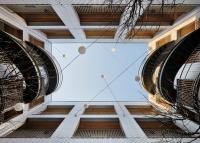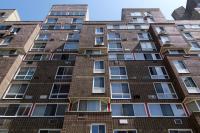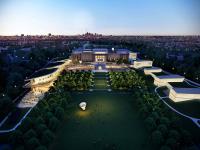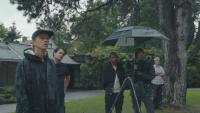Westhafen-Tower
Frankfurt am Main, Germany
The new “Westharbour” quarter was one of the most interesting and attractive new urban developments in Frankfurt due to its central location and being right on the river. schneider+schumacher developed main parts of the master planning and executed four of its key buildings (West Harbour Tower, West Harbour House, West Harbour Bridge-Building and West Harbour-Pier) at both ends of the site.
Westhafen Tower (West Harbour Tower) is one of the most recent and modern high rise buildings in Frankfurt. It marks one of the main entry points to the city as well as the new West Harbour quarter. Its striking façade has already made it a new landmark on the skyline of Frankfurt. The triangular windows create a multitude of reflections, making it constantly change colour and transparency. The circular footprint of the tower makes maximum use of the floor area while minimizing the area of the façade (this is due to the geometric ratio of area to circumference in a circle) whereas the square shaped floor plates inside the circle create an optimum in efficiency. About 80% of the gross floor area is to let.
The superimposition of circle and square creates four-storey atrium spaces which can be used as winter gardens. They serve as thermal buffer zones and further give the possibility to internally connect the floors inside these interstices. Thus a secondary circulation system can be established independent of the escape stairs located inside the core. Above ground the building consists of a reception area on the ground floor, 28 office floors and a double height technical floor. The central core holds all vertical circulation, services, sanitary – and meeting rooms and is surrounded by flexible office space which permits cellular as well as open plan office fit out. Underground the core of the building, holding more services and storage space, is surrounded by a spiralling parking garage.
The structure of the building is made of in-situ concrete with concrete-filled steel columns. The façade is generated by prefabricated elements, two triangular panels forming one element. The triangular windows can be opened to supply natural ventilation to the offices, either through the winter gardens, or directly through the façade. This is the case at the corners of the square floor plates where the office space extends to the outer skin. The floor to ceiling high glazing achieves a maximum in transparency. On the top office floor triangular cut outs perforate the tilted concrete ceiling. They crown the top of the building, a widely visible sign at night.
- Architects
- schneider+schumacher
- Location
- Frankfurt am Main, Germany
- Year
- 2003













